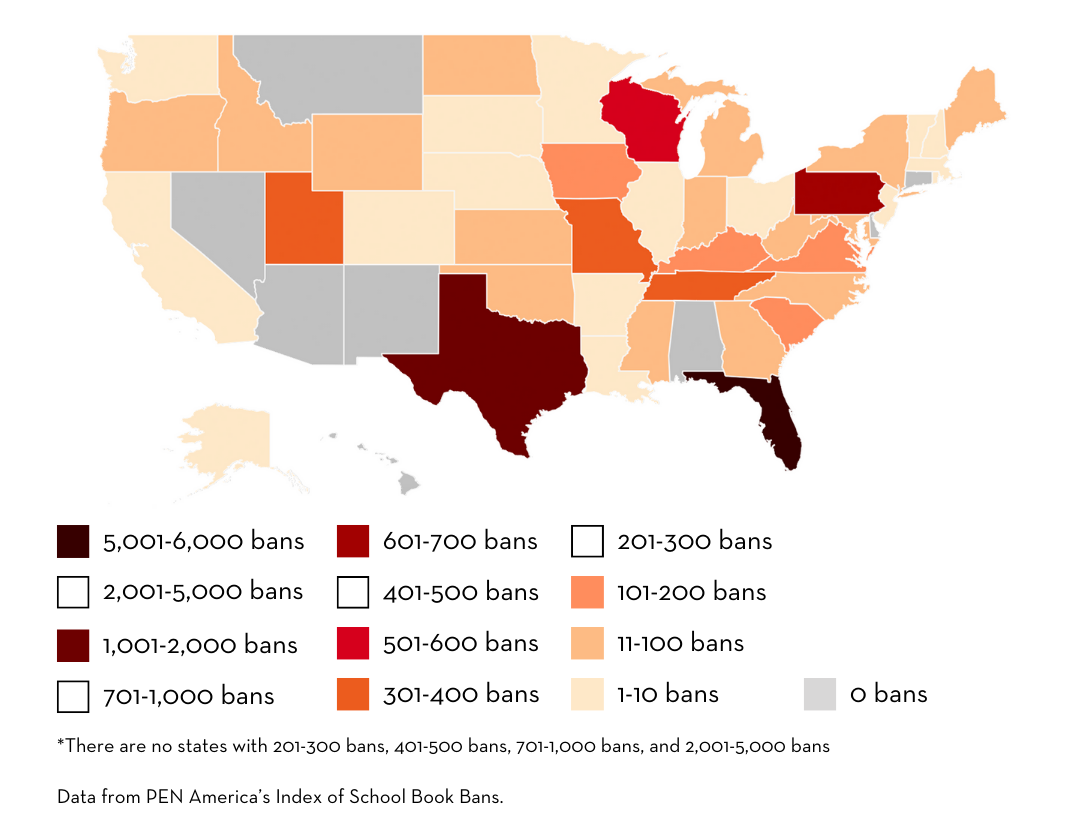

PEN America says there was an “unprecedented” surge in e-book bans through the latter half of 2023, in response to a brand new report.
The free expression group says that from July-December of final 12 months, it recorded 4,349 cases of e-book bans throughout 23 states and 52 public college districts. The report says extra books had been banned in these six months than within the 12 months of the 2022-2023 college 12 months.

PEN America says it attracts its info on bans from “publicly accessible information on district or college web sites, information sources, public data requests, and college board minutes.”
Among the many key takeaways:
- The overwhelming majority of faculty e-book bans occurred in Florida, with 3,135 bans throughout 11 of the state’s college districts. A spokesperson with Florida’s Division of Schooling declined NPR’s request for remark.
- Ebook bans are sometimes instigated by a small variety of individuals. Challenges from one father or mother result in a temporary banning of 444 books in a college district in Wisconsin.
- Those that ban books typically cite “obscenity regulation and hyperbolic rhetoric about ‘porn in colleges’ to justify banning books about sexual violence and LGBTQ+ subjects (and particularly, trans identities),” the report says.
- There’s a comparable surge in resistance towards the bans, says the report. Authors, college students and others are “preventing again in inventive and highly effective methods.”
Who’s doing the banning?
A study by The Washington Submit discovered that in 2021-2022, “Simply 11 individuals had been chargeable for submitting 60 %” of e-book challenges.
At a press convention at this time, free expression advocates from across the nation that joined PEN America to debate bans talked in regards to the seemingly-outsized energy of a small, however vocal, group.

Highschool senior Quinlen Schachle, the president of the Alaska Affiliation of Pupil Governments, mentioned when he attends college board conferences, “It is, like, [the same] one grownup that comes up day-after-day and challenges a brand new e-book. It’s not a involved a bunch of oldsters coming in droves to those conferences.”
Laney Hawes, Co-Director of the Texas Freedom to Learn Mission mentioned books are sometimes banned due to “a handful of lists which might be being circulated to completely different college districts” and never due to “a father or mother whose baby finds the e-book they usually have an issue with it.”

PEN America defines a e-book ban as “any motion taken towards a e-book primarily based on its content material…that results in a beforehand accessible e-book being both utterly faraway from availability to college students, or the place entry to a e-book is restricted or diminished.”
The conservative American Enterprise Institute took exception to PEN America’s April 2022 banned books report. In a report for the Schooling Freedom Institute, AEI mentioned it discovered that “nearly three-quarters of the books that PEN listed as banned had been nonetheless accessible at school libraries in the identical districts from which PEN claimed they’d been banned.”
You may learn PEN America’s full report here.
This story was edited by Jennifer Vanasco.
